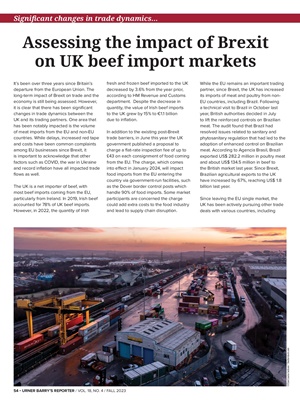
54 • URNER BARRY'S REPORTER / VOL. 18, NO. 4 / FALL 2023
While the EU remains an important trading
partner, since Brexit, the UK has increased
its imports of meat and poultry from nonEU countries, including Brazil. Following
a technical visit to Brazil in October last
year, British authorities decided in July
to lift the reinforced controls on Brazilian
meat. The audit found that Brazil had
resolved issues related to sanitary and
phytosanitary regulation that had led to the
adoption of enhanced control on Brazilian
meat. According to Agencia Brasil, Brazil
exported US$ 282.2 million in poultry meat
and about US$ 134.5 million in beef to
the British market last year. Since Brexit,
Brazilian agricultural exports to the UK
have increased by 67%, reaching US$ 1.8
billion last year.
Since leaving the EU single market, the
UK has been actively pursuing other trade
deals with various countries, including
It's been over three years since Britain's
departure from the European Union. The
long-term impact of Brexit on trade and the
economy is still being assessed. However,
it is clear that there has been significant
changes in trade dynamics between the
UK and its trading partners. One area that
has been notably impacted is the volume
of meat imports from the EU and non-EU
countries. While delays, increased red tape
and costs have been common complaints
among EU businesses since Brexit, it
is important to acknowledge that other
factors such as COVID, the war in Ukraine
and record inflation have all impacted trade
flows as well.
The UK is a net importer of beef, with
most beef imports coming from the EU,
particularly from Ireland. In 2019, Irish beef
accounted for 78% of UK beef imports.
However, in 2022, the quantity of Irish
fresh and frozen beef imported to the UK
decreased by 3.6% from the year prior,
according to HM Revenue and Customs
department. Despite the decrease in
quantity, the value of Irish beef imports
to the UK grew by 15% to €1.1 billion
due to inflation.
In addition to the existing post-Brexit
trade barriers, in June this year the UK
government published a proposal to
charge a flat-rate inspection fee of up to
£43 on each consignment of food coming
from the EU. The charge, which comes
into effect in January 2024, will impact
food imports from the EU entering the
country via government-run facilities, such
as the Dover border control posts which
handle 90% of food imports. Some market
participants are concerned the charge
could add extra costs to the food industry
and lead to supply chain disruption.
Significant changes in trade dynamics…
Assessing the impact of Brexit
on UK beef import markets
©Clare Louise Jackson / Shutterstock.com